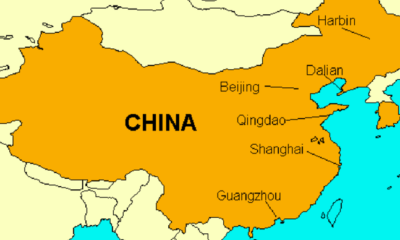Business
China Retaliates With Tariffs On U.S. Energy, Autos Amid Trade Tensions
By Benjamin Abioye

China has announced new tariffs on U.S. goods, including energy, vehicles, and equipment, in response to the U.S. imposing additional duties on Chinese products.
This escalation between the world’s two largest economies has raised tensions further. The tariffs imposed by China include 15 percent duties on coal and liquefied natural gas, while crude oil, agricultural machinery, large vehicles, and pickup trucks face 10 percent duties. China’s market for U.S. energy exports is significant, with over $7 billion in oil, coal, and liquefied natural gas imports last year. However, these figures are small compared to China’s imports from other nations like Russia, from which it bought $94 billion worth of goods last year.
The Chinese government criticized the U.S. move, stating it violated World Trade Organization rules and disrupted trade relations. China also announced that it would file a complaint with the WTO over what it called “unilateral tariff hikes.” In addition to the tariffs, China launched an investigation into Google and added U.S. companies such as PVH Corp. (owner of brands like Tommy Hilfiger and Calvin Klein) and biotech firm Illumina to a list of “unreliable entities.” China also imposed export controls on rare metals and chemicals, including tungsten and tellurium, which are crucial for industrial applications.
Zhang Zhiwei of Pinpoint Asset Management suggested that China’s retaliation wasn’t overly aggressive, as it targeted only certain U.S. products in response to the U.S. tariffs affecting all Chinese exports. He added that this could be the start of a long negotiation process between the two nations. Meanwhile, U.S. President Donald Trump announced plans to discuss the situation with Chinese President Xi Jinping in the next 24 hours.
On the other hand, Trump had recently made headlines by announcing new tariffs on Canada and Mexico, claiming they were aimed at addressing illegal immigration and the flow of fentanyl into the U.S. However, he agreed to pause the tariffs after reaching deals with Mexico and Canada to bolster border security. Trump also revealed that Mexican President Claudia Sheinbaum and Canadian Prime Minister Justin Trudeau had committed to taking steps to address these issues. In return, Trump decided to hold off on the tariffs for now.
Despite the agreements with Mexico and Canada, Trump’s trade war rhetoric has sparked concerns about global economic stability. Tensions between the U.S. and Canada are particularly high, with Trudeau and Trump exchanging harsh words. Canada responded by vowing to take strong measures, such as deploying nearly 10,000 frontline officers to secure the border and cracking down on money laundering. However, Canada also seemed frustrated with Trump’s recent comments about the possibility of Canada becoming the 51st U.S. state.
While Trump’s policies have sparked criticism both within and outside the U.S., the trade war with China shows no signs of ending soon. The administration has made it clear that its focus is on addressing the flow of illegal drugs into the country, with National Economic Council Director Kevin Hassett dismissing claims of a trade war, calling it a “drug war” instead. However, some analysts note that only a small quantity of drugs actually enters the U.S. from Canada.
This situation continues to develop, with both China and the U.S. weighing their next moves in a trade conflict that has global implications.
Send Us A Press Statement Advertise With Us Contact Us
And For More Nigerian News Visit GWG.NG













